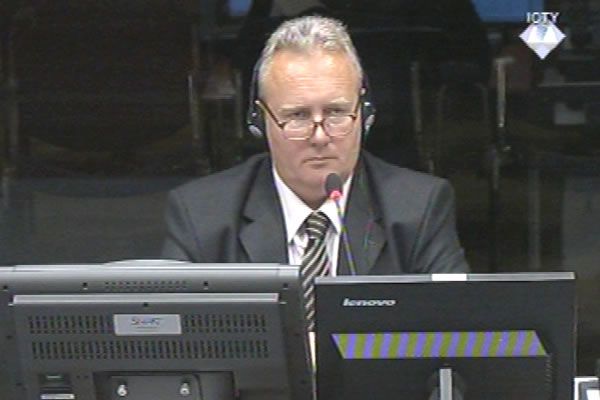Home
WHO BROUGHT PRISONERS TO FRONTLINES
In his evidence in Ratko Mladic’s defense a former VRS officer denied the claim that the Serb troops had opened fire from Grbavica on civilians in Sarajevo. Soldiers in the witness’s brigade didn’t rape, rob and expel non-Serbs. He ‘wasn’t aware’ that soldiers from other VRS units in Grbavica engaged in this kind of behavior. The witness admitted he knew that prisoners were used for forced labor on the frontlines
 Dragan Maletic, defence witness at Rako Mladic trial
Dragan Maletic, defence witness at Rako Mladic trial Dragan Maletic, a former unit commander in the 1st Sarajevo Motorized Brigade, gave evidence at the trial of Ratko Mladic. The 1st Sarajevo Motorized Brigade held positions along the Miljacka River, between the Vrbanja Bridge and the Bratstva i Jedinstva Bridge. Maletic commanded the unit from the beginning of the conflict to the end of 1992 when he was appointed assistant commander for intelligence and security in the 3rd Battalion.
In his statement to Mladic’s defense, Maletic said that during the war his unit mostly carried out defensive operations, and ‘never opened fire, especially not sniper fire, on civilians’. According to Maletic, his troops never opened fire from the Metalka buildings in Grbavica; the prosecution alleges that during the war snipers often fired from those buildings at the Holiday Inn Hotel along the so-called ‘sniper alley’. In the examination-in-chief Maletic said that Serb soldiers didn’t climb to the higher floors in those buildings because they ‘felt safer closer to the ground’. In his statement to the defense Maletic said his battalion had a sniper unit which was subordinated to the commander. However, Maletic didn’t know anything about their tasks and the way in which they were executed.
In the cross-examination prosecutor Adam Weber confronted the witness with a statement made by the deputy battalion commander Milan Hrvacevic to the Bosnian MUP in 1996. In the statement Hrvacevic said that two snipers – Zlatko Subotic and Marinko Krneta – were particularly active and often opened fire on the buildings. The prosecutor wanted to know how Hrvacevic knew about the snipers, while Maletic, who was an intelligence officer, ‘was not aware’ of their activities. Maletic replied that five or six years after the war Hrvacevic told him that he had signed the statement ‘under duress’.
At one point, prosecutor Weber asked the witness to give him the copy of the statement he had in front of him during the cross-examination. Maletic claimed that before he took the stand he made some notes on the papers regarding some documents he had been shown during his evidence at the Karadzic trial. Some notes had to do with the killing of prisoners who were doing forced labor at the frontlines and who tried to escape. If asked about those incidents, Miletic was ready to say that those were justified because the prisoners could tell the enemy about the VRS positions if they escaped.
The prosecution played a video made by the Sky News reporter Van Linden about prisoners being taken from the KPD Kula prison to do forced labor, and then he produced Maletic’s written report on two prisoners trying to escape on 21 May 1993. Judge Orie asked the witness who ordered the troops to fire on the prisoners. Maletic replied that ‘nobody ordered it’, adding that it was considered appropriate to open fire on the escapees in order to prevent them from revealing the Serb positions to the enemy. Also, Maletic said that he did not bring them there. This prompted Judge Orie to remark that certainly the prisoners didn’t say to each other, ‘hey, let’s go to the frontline and build a bunker there’: they were obviously brought there by the Serb soldiers to do forced labor.
The prosecutor asked a series of questions about rape, robbing and expulsions of non-Serbs in Grbavica. He wanted Maletic to tell him what, if anything, he did about those crimes. The witness didn’t do anything, he explained, because his soldiers didn’t commit any such crimes. Maletic remained adamant even after the prosecutor showed him documents confirming that Maletic’s superiors – Ratko Mladic included – knew about the rapes and other crimes in Grbavica.
In the re-examination, Maletic said the prisoners were taken to do forced labor at night for their own safety. The orders issued by the command not to abuse civilians and to treat prisoners of war in line with the Geneva Conventions were strictly observed. Judge Moloto asked the witness what he did when fire was opened on two prisoners who were trying to escape. Maletic replied that he didn’t do anything.
Ratko Mladic’s trial continued with the evidence of Milorad Dzido.Linked Reports
- Case : Mladic
- 2014-05-28 ‘STAGED’ MASSACRE
- 2014-05-27 WITNESS: CIVILIAN CASUALTIES WERE COLLATERAL DAMAGE
- 2014-05-26 GRATEFUL TO ‘SERB BROTHERS’
- 2014-05-30 APPLICATION FOR A CHANGE OF RESIDENCE
- 2014-05-30 MARKALE 1 COMMISSION: PHANTOM OR REAL?
- 2014-06-02 EVIDENCE ON EVENTS BEFORE AND AFTER PERIOD RELEVANT FOR INDICTMENT
